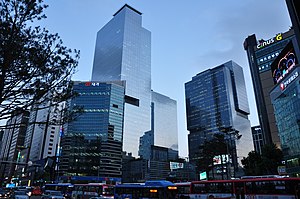Samsung
From Wikipedia, the free encyclopedia
This article is about the conglomerate company. For the publicly traded company, see Samsung Electronics.
|
Samsung Headquarters the "Samsung Town" in Seoul
|
|
|
Native name
|
삼성 |
|---|---|
| Public[citation needed] | |
| Industry | Conglomerate |
| Founded | 1938 |
| Founder | Lee Byung-chul |
| Headquarters | Samsung Town, Seocho-gu, Seoul, South Korea |
| Coordinates | 37.496609°N 127.026902°ECoordinates: 37.496609°N 127.026902°E |
|
Area served
|
Worldwide |
|
Key people
|
Lee Kun-hee (Chairman of Samsung Electronics) Lee Jae-yong (Vice chairman of Samsung Electronics) |
| Products | Apparel, chemicals, consumer electronics, electronic components, medical equipment, semiconductors, ships, telecommunications equipment |
| Services | Advertising, construction, entertainment, financial services, hospitality, information and communications technology, medical and health care services, retail, shipbuilding |
| Revenue | |
| Total assets | |
| Total equity | |
|
Number of employees
|
489,000 (2014)[1] |
| Subsidiaries | [citation needed]Samsung Electronics Samsung C&T Corporation Samsung Heavy Industries Samsung SDS Samsung Life Insurance Samsung Fire & Marine Insurance Cheil Worldwide |
| Slogan | Imagine the Possibilities |
| Website | samsung |
| Samsung | |
| Hangul | 삼성 |
|---|---|
| Hanja | 三星 |
| Revised Romanization | Samseong |
| McCune–Reischauer | Samsŏng |
| History |
|---|
| Business culture |
| Industries |
| Regional |
| Related topics |
Samsung was founded by Lee Byung-chul in 1938 as a trading company. Over the next three decades, the group diversified into areas including food processing, textiles, insurance, securities and retail. Samsung entered the electronics industry in the late 1960s and the construction and shipbuilding industries in the mid-1970s; these areas would drive its subsequent growth. Following Lee's death in 1987, Samsung was separated into four business groups – Samsung Group, Shinsegae Group, CJ Group and Hansol Group. Since 1990s, Samsung has increasingly globalized its activities and electronics, particularly mobile phones and semiconductors, have become its most important source of income.
Notable Samsung industrial subsidiaries[citation needed] include Samsung Electronics (the world's largest information technology company measured by 2012 revenues, and 4th in market value),[2] Samsung Heavy Industries (the world's 2nd-largest shipbuilder measured by 2010 revenues),[3] and Samsung Engineering and Samsung C&T (respectively the world's 13th and 36th-largest construction companies).[4] Other notable subsidiaries include Samsung Life Insurance (the world's 14th-largest life insurance company),[5] Samsung Everland (operator of Everland Resort, the oldest theme park in South Korea)[6] and Cheil Worldwide (the world's 15th-largest advertising agency measured by 2012 revenues).[7][8]
Samsung has a powerful influence on South Korea's economic development, politics, media and culture and has been a major driving force behind the "Miracle on the Han River".[9][10] Its affiliate companies produce around a fifth of South Korea's total exports.[11] Samsung's revenue was equal to 17% of South Korea's $1,082 billion GDP.[12]



Tidak ada komentar:
Posting Komentar